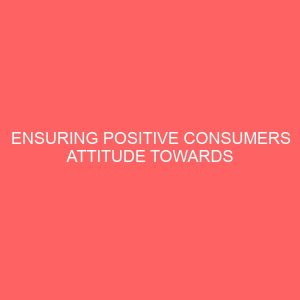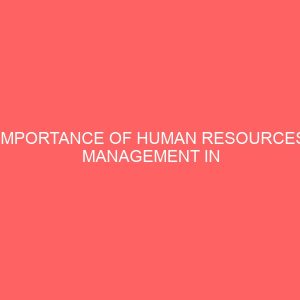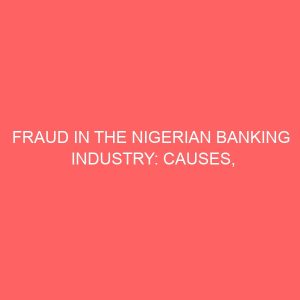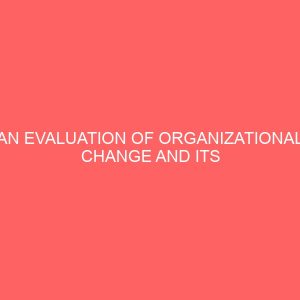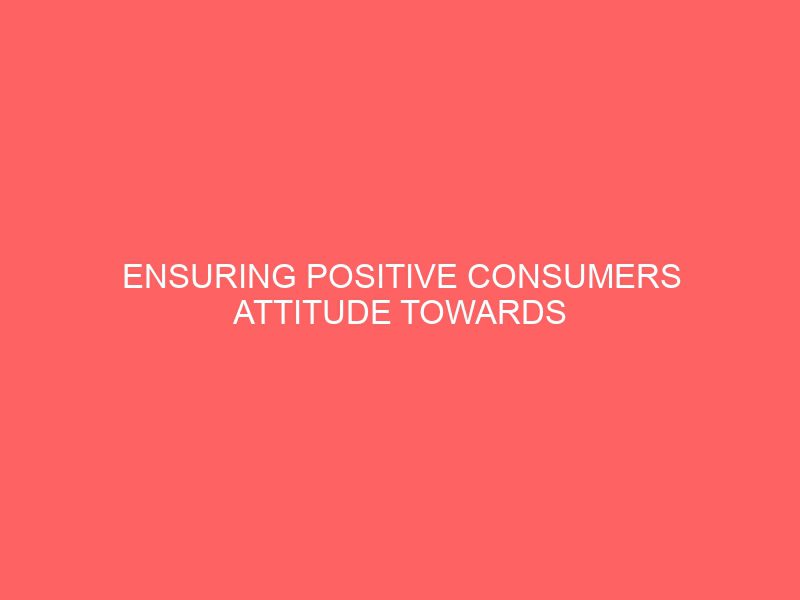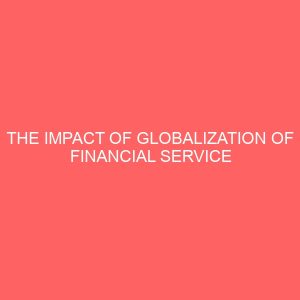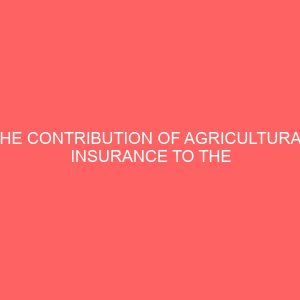Description
ABSTRACT
This project is designed to determine the attitude of the general public towards insurance contract in Nigeria. The topic to be discussed is “ensuring positive consumers attitude towards insurance contract in Nigeria. A study of IGI Enugu”. In chapter one of this work, I treated the introduction, significance of the study, statement of problems and definition of terms and also limitations of the study. In chapter two, I reviewed some related literature. Chapter three is the research design and methodology which focused on the method employed in the course of this work. It related to the type of sample method of collecting data, it also provide the types of data used and its sources. In chapter four, I presented the summary of findings and discussion. Finally, in chapter five I presented the conclusion and recommendations. Where I for saw the need of the insurance practitioner putting more efforts towards attracting the general public in adurring the important of insurance
TABLE OF CONTENT
Title page ii Certification iii
Dedication iv
Acknowledgement v
Table of content vi
CHAPTER ONE
INTRODUCTION
1.1 Background of study 1
1.2 Statement of the problem 6
1.3 Objective of study 6
1.4 Research question 7
1.5 Significance of the study 8
1.6 Scope of the study 8
1.7 Limitation of the study 9
1.6 Definition of terms 10
Reference 12
CHAPTER TWO
REVIEW OF RELATED LITERATURE
2.1 Meaning and purpose of insurance 13
2.2 The insurance market 15
2.2.1The insurance market is up of the following 15
2.2.2The insurers 16
2.2.3The insurance intermediaries 17
2.3 Classes of insurance contracts 17
2.3.1Marine insurance 18
2.3.2Fire insurance 18
2.3.3Life assurance business 19
2.3.4Accident insurance 19
2.4 Factor affecting the insurance contract 20
2.4.1Size and the distribution of population 21
2.4.2National income 22
2.4.3Market competition 22
2.5 Consumers attitudes towards insurance contracts in
Nigeria 23
2.5.1Religious effect 24
2.5.2Social clubs and age grades 24
2.5.3Ignorant 25
2.5.4Claim procedure 26
2.5.5Low standard of living 27
2.5.6Fire insurance 27
2.5.7Motor insurance 29
2.5.8Marine insurance 30
2.6 Buyers/consumers behaviour. 31
2.7 Claims record 32
2.8 Constraints of marketing insurance products 34
2.8.1 Problems of marketing insurance in Nigeria 35
2.8.2 Culture 35
2.8.3 Political 35
2.8.4 Economy 36
2.8.5 Educational system 36
2.9 Odds in marketing insurance products 37
2.9.1 Quality of service /poor marketing 37
2.9.2 Competition 38
2.9.3 Financial stability 38
2.9.4 Training 39
2.9.5 Fake operation 39
2.9.6 Poor channel of distribution 39
2.10 Legal and regulatory constraints 40
Reference 42
CHAPTER THREE 3.1 Research design and methodology 43
3.2 Sources of data 43
3.2.1Primary data 43
3.2.2Secondary data 43
3.3 Population of study 44
3.4 Determination of sample size 44
3.5 Reliability of the study 45
CHAPTER FOUR
Summary of findings and discussion
4.1 Findings 46
4.2 Discussion 64
CHAPTER FIVE
CONCLUSION AND RECOMMENDATION
5.1 Conclusion 48
5.2 Recommendation 49
Bibliography 51
Appendix I 53
Appendix II 54
CHAPTER ONE
INTRODUCTION
1.1 BACKGROUND OF THE STUDY
This research work will first look into insurance is all about; insurance as a risk management device is, therefore a contract to the economic well-being of man. It is also endemic in any society as a way of averting and ameliorating the financial consequences of misfortune has been engaging the attention of man at every age. Before the advent of the British Merchant in Nigeria, there was no organized insurance business as we know it today. There has been some existed traditional system of risk sharing, which could be described as crud or primitive forms of mutual and social insurance schemes. The extended family system, age-grade association, town union were some mutual insurance like schemes for showing benevolence to their members who had suffered some misfortunes such as death, ill-health, fire ravage or court case. Both the extended family system and clan or town union still exists in Nigeria today, but most of their insurance function ahs been taken over by an organized insurance system. Similarly, the age grade system still plays on important role in some parts of the country, especially in matters relating to moral development, but like the extended family system and clan unions, they no longer render any noticeable insurance servicers to their members. Then the determinant of every marketing is the ability of the producers to provide for the consumers the quality and quantity of goods that will satisfy then at affordable price, provided at accessible place. In event to provide these goods, the producer should consider and see the customer or clients as the “king”

